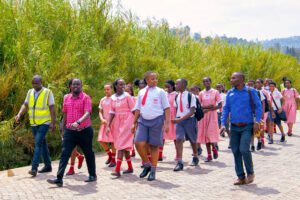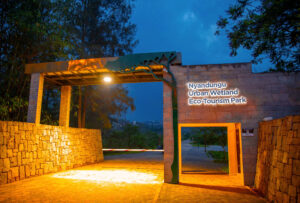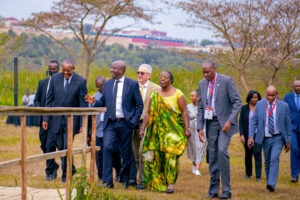According to Faustin Munyazikwiye, the Deputy Director General of the Rwanda Environment Management Authority, the city’s latest project, which includes the creation of green and car-free zones, encourages sporting and urban tourism. The city has zeroed on its ecological hotspots.
Kigali goes cleaner, greener

By Ange de la Victoire Dusabemungu, bird story agency
Seated at the base of three hills – Mount Kigali, Jali and Bumbogo – Kigali City is vested with wide sidewalks, spotless roads, trees and plenty of green spaces. It is a city whose peaceful facade is part of a healing process that remains vitally important three decades after the genocide that scarred its populace.
Accentuated by modern highrises, the city’s outlook is best appreciated from one of the hills, from where the city’s growing number of “eco-parks” is readily evident.
According to Faustin Munyazikwiye, the Deputy Director General of the Rwanda Environment Management Authority, the city’s latest project, which includes the creation of green and car-free zones, encourages sporting and urban tourism. The city has zeroed on its ecological hotspots.
“The government of Rwanda, indeed, in the bid of promoting environmental sustainability, has taken a decision of prioritising rehabilitation of critical ecosystems, including wetlands, forests, and other critical and endangered ecosystems,” he explained.
The city is being carefully and purposefully guided by a vision of the future – one of a “new age” of modern, commercial, recreational and innovative African urban centers.
Rwanda’s capital walks the path of car-free zones and eco-parks designed to encourage outdoor sports and urban tourism as it chases “green city” status.
Inspired at least in part by what Ghanaian author Sangu Delle describes in his book Making Futures: Young Entrepreneurs in a Dynamic Africa, Kigali aspires to be a city of moguls-in-the-making, of socialpreneurs, creatives and techies; another crucial element in the country’s physical and psychological recovery. And very clearly, the way forward is green.

This has meant removing dwellings in the city’s five wetlands – Kibumba, Nyabugogo, Rugenge-Rwintare, Rwampara and Gikondo – in a move the environmental authority and city planners say will “improve access to basic services, enhance resilience and strengthen urban planning and management” for the city.
“We are offering a recreational hub or recreational environment where people can start enjoying nature. We are not destroying the environment or critical ecosystems,” Munyazikwiye said at the launch of the initiative.

One of the landmarks of the rehabilitation of the wetlands is the Nyandungu Eco-Tourism Park. Formerly housing an informal settlement, it is now a key urban tourism spot
“For the sake of restoring the environment, we want to see the economic benefits, we want to see biodiversity benefits, and above all want the social interaction between the people and nature,” said the Deputy Director General of REMA, who added that the work which started in 2016 had cost some 5 billion Rwandan francs (US$ 4.5 million).
The restoration of the Nyandungu wetland and the creation of an eco-tourism park involved planting 17,000 trees comprising 55 indigenous species.
The 121-hectare park features a medicinal garden, five catchment ponds, three recreation ponds, an information centre, a restaurant as well as 10km of walkways and bike lanes. It also sports a “Pope’s Garden” in honour of Pope John Paul II who visited the country in 1990, four years before the genocide.
The city is today a jumping-off point for tourists visiting tea plantations and parks up-country, including the world famous Virunga National Park with its mountain gorillas, is kept clean by an army of women in reflective yellow jackets. Signposts point the way to international hotels like the Marriott, Sheraton, Radisson and Serena.
Roads are lined on either side by flowers and palms and the traffic flows smoothly. It takes just 30 minutes to get to the city center from Kigali International Airport using an E-moto or any other cab service.
And what strikes you is the cleanliness and fresh air that greets you as you enter the city, which is kept clean by an army of women dressed in yellow reflective jackets.
There is a litter bin at every turn. “Put your litter in here!’ notices instruct passers-by.
Grace Muhawenimana is a cleaner in the neighbourhood of Kimihurura. She starts work at 6.30 am, helping ensure the city remains spotless.
“There are people who may think lowly of my job, but I am proud of what I do. This is what supports our families and keeps our city clean,” she said.

In monthly clean-ups across the city of 1.2 million people, President Paul Kagame who espouses the age-old communal spirit of Umuganda (helping each other), personally participates.
Now a Green City Kigali project is seeking to develop a model community in a 600-ha area. Situated in the Kinyinya Hill area of Gasabo District the model village will provide affordable housing for target groups in a sustainable and culturally compatible, climate-resilient urban community.
The area will “establish new standards that can be replicated elsewhere in Rwanda and beyond–setting a trajectory towards a Net Zero future” according to the city’s planners.
The development is seen as the start of a planned US$5 billion Green City Kigali initiative, part of the long-term vision of making Rwanda a green economy that generates sustained economic growth while ensuring social well-being and mitigating environmental risks.
The planners are keen to ensure that all new infrastructure – including roads, housing and commercial buildings conform to climate-resilient, urban standards.
“Rwanda is committed to promoting sustainable cities and the Green City Kigali will demonstrate that it’s possible to build a sustainable, large-scale urban development,“ said Teddy Mugabo, Chief Executive Officer of Rwanda Green Fund, the main body that collects and sources funds for city’s Green Programmes, during the unveiling of FCB Studios, the company designing a16-hectare mixed-use pilot in the northwest section of the Kinyinya Hill development.
According to Mugabo, the country is committed to the green agenda.
“It will undoubtedly serve as a catalyst for change, not only in Rwanda but also in the region. We are delighted to be working with FCBStudios on the design of the Green City Kigali master plan and detailed designs for the pilot phase. We can’t wait to get started!” she said.
bird story agency




